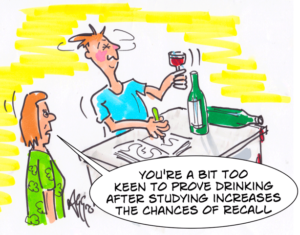03 August 2017
Nunc Est Bibendum
But try to time it right.
By Chin Chin
Sometimes new research touches the very fundamentals of our lives and the conclusion reached by the University of Exeter, that we remember more if we have a drink or two after the event, is certainly in that category. Take buying drinks, for example. Now most of the people with whom I go to the pub make it a rule not to drink on their own round. That isn’t because they are skinflints: dear me no, nothing could be further from the case. They are hospitable people who always like to spend their hard earned money on drinks for others.
Still, look at the result of their generosity. As the academics at Exeter University have confirmed, drinking after something happens locks the memory of it in place – because, as I understand it, the drink blocks subsequent impressions and allows the old ones to “embed”, rather like toes in those surgical sandals now so fashionable in high society. The result is that people only remember the rounds bought by their friends and not their own. You might think that that meant that they would end up offering another round too soon, but that would be to underestimate the resourcefulness of the North Londoner. No, they appreciate the problem and deliberately compensate for it.
“Oi, Chin, it’s your round,” someone will call out. But I don’t fall for that one. I am sure that I must have bought hundreds of rounds which I simply cannot remember because I didn’t drink after buying them. My friends are just trying to take advantage of my abstemiousness. I won’t have that although, rather than face them out, it is easier to slip off to that loo which has the convenient door to the car park.
From many points of view it is useful to have the rule that “alcohol preserves facts” officially recognised. Suppose, for example, that you have been arrested for an affray outside a pub and your evidence differs from that of the police;
Defending counsel: “Tell me Constable, in what state did you find the accused when you arrived?”
Policeman: “I’d say he was rat-arsed, Sir.”
Counsel: “Very drunk, do you mean?”
Policeman: “Yes, he was still drinking hard when I apprehended him.”
Counsel: “And were you drinking, Officer?“
Policeman: “Certainly not, Sir, I was on duty”
Counsel: “Then do you accept, Officer, that in the light of the new research from Exeter University, the accused is likely to have a better recollection of events than you have?”
There we are. Case dismissed. The truth pickled in alcohol like a fly in aspic. The cleverer criminals will always carry a flask of spirits in their pocket so that they can fix their version of events beyond reasonable doubt. It will be their answer to the video cameras worn by the police.
But for the scientist, the important thing to note about the Exeter research is that there are two sides to it. Someone who has had a drink is more likely to remember what happened before the drink, but on the other hand it is correspondingly harder for him (or, let’s be fair, for her) to remember what happened later. The timing of the drink is therefore crucial.
 Imagine you are revising for an exam. A glass of wine early in your evening’s revision will reduce your recollection of what you read later. Defer the glass until after you have finished and it will seal into place all that you have learnt as though you had a photographic memory.
Imagine you are revising for an exam. A glass of wine early in your evening’s revision will reduce your recollection of what you read later. Defer the glass until after you have finished and it will seal into place all that you have learnt as though you had a photographic memory.
There are implications too for the Shaw Sheet’s more criminally minded readers. There you are, about to commit a fraud; let’s suppose it is the full Sir Jasper and will result in women being forced to make their living on the street and their children searching for scraps in the gutter. Well, if you have had a large drink before you begin, it will be relatively easy forget the details afterwards. Soon they will become fuzzy in your mind and, before long, it will be possible for you to persuade yourself, and any investigating authorities, that you were motivated by the most charitable of instincts and that the results were merely a sad mistake, the lamentable consequence of others not living up to their responsibilities. Result: no conscience and holidays at expensive hotels in the South of France. Do it the other way round, however; have your drink after you have signed the forged papers and the guilt will be etched into your brain. You will toss and turn at night, waking in your tent to see queues of those who you have defrauded processing past, twitching nervously whenever the word irregularity is used, and ending up with a maudlin plea for forgiveness from your victims spoiling an otherwise very elegantly written suicide note. And all that because you had your drink at the wrong time.
“Eat, drink, and be merry for tomorrow we die,” but we will die with a better conscience if we remember to do the drinking bit at the beginning.
If you enjoyed this article please share it using the buttons above.
Please click here if you would like a weekly email on publication of the ShawSheet

